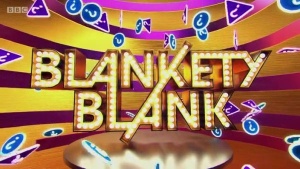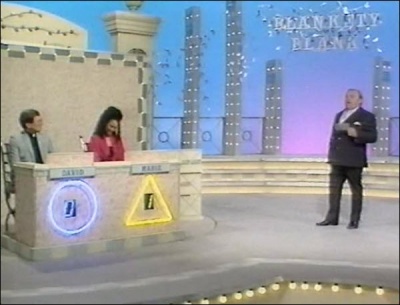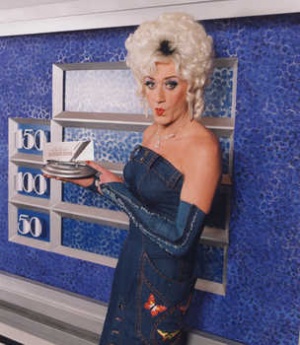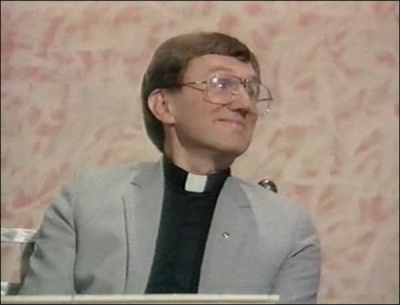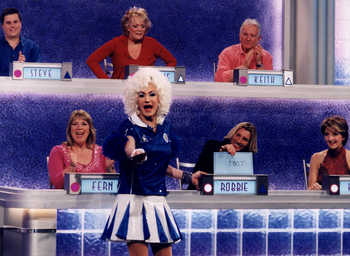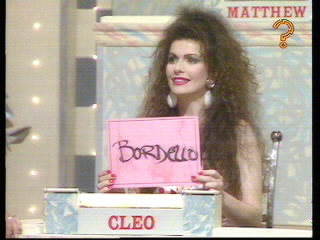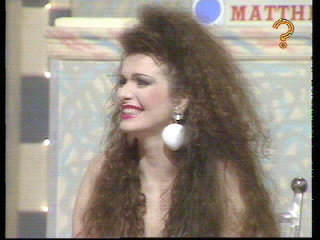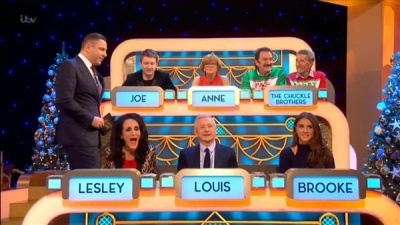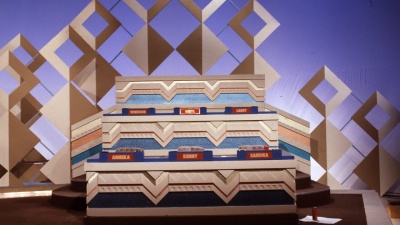Blankety Blank
(→Trivia: 23 episodes, if anyone trusts https://www.anorakzone.com/blanketyblankrankb2.html.) |
(→Trivia) |
||
| Line 153: | Line 153: | ||
== Trivia == | == Trivia == | ||
| - | All good things come to those who wait. So do long-lost episodes of ''Blankety Blank''. Eight episodes of Lily Savage's 2002 series of the show were never shown on ITV. They emerged on the Challenge channel in 2005, then again in February 2011 and again in September 2016. One episode included a posthumous appearance of [[A Song for Europe]] host Christopher Price | + | Before Lily Savage's version, the BBC aired a selection of Wogan episodes from November 1997 to February 1998 in a daytime slot before Children's BBC programming with newly recorded introductions and sign offs from the man himself. |
| + | |||
| + | All good things come to those who wait. So do long-lost episodes of ''Blankety Blank''. Eight episodes of Lily Savage's 2002 series of the show were never shown on ITV. They emerged on the Challenge channel in 2005, then again in February 2011 and again in September 2016. One episode included a posthumous appearance of [[A Song for Europe]] host Christopher Price. | ||
The late Captain Sir Tom Moore, the retired soldier and future NHS fundraiser, was a contestant on [[Terry Wogan]]'s last episode, the 1983 Christmas special. | The late Captain Sir Tom Moore, the retired soldier and future NHS fundraiser, was a contestant on [[Terry Wogan]]'s last episode, the 1983 Christmas special. | ||
| - | Les Dawson's second series took an unexpected | + | Les Dawson's second series took an unexpected mid-series break due to Dawson almost dying of prostate failure, which he might have got away with the press not knowing about had he not missed a recording session. For at least the last two episodes he'd recorded beforehand he was noticeably ill; you'd think the BBC would have had a stand-by presenter but apparently not. Or did Dawson himself insist on carrying on regardless in spite of everything - 'the show must go on' and all that? Possibly, but we'll never know for sure. |
The first episode of [[Bradley Walsh]]'s second series was pulled twice by the deaths of queens; its premiere by the death of Queen Elizabeth II, which caused the entire series to be knocked back by a week, while a 1 April 2023 repeat was replaced by a repeat of a 1998 episode from Lily Savage's Blankety Blank, in tribute to the late [[Paul O'Grady]]. | The first episode of [[Bradley Walsh]]'s second series was pulled twice by the deaths of queens; its premiere by the death of Queen Elizabeth II, which caused the entire series to be knocked back by a week, while a 1 April 2023 repeat was replaced by a repeat of a 1998 episode from Lily Savage's Blankety Blank, in tribute to the late [[Paul O'Grady]]. | ||
Revision as of 05:45, 29 July 2024
Contents |
Host
Terry Wogan (1979-83)
Les Dawson (1984-90)
"Lily Savage" (Paul O'Grady) (1997-2002)
Vernon Kay (2007 special)
Paul O'Grady (again, 2011 special)
David Walliams (2016 special)
Bradley Walsh (2020-)
Broadcast
BBC1, 18 January 1979 to 12 March 1990 (209 episodes in 12 series + 10 specials)
Fremantle for BBC One, 26 December 1997 to 19 September 1998 (13 episodes in 1 series + 1 special)
as Lily Savage's Blankety Blank
Grundy for BBC One, 26 June to 28 December 1999 (12 episodes in 1 series + 1 special)
Grundy for ITV, 7 January to 17 June 2001 (20 episodes in 1 series)
Thames for ITV1, 4 May to 10 August 2002 (12 episodes in 1 series + 8 unaired by original network)
Challenge, 2005 (last 8 episodes - see Trivia below)
ITV Productions and TalkbackThames for ITV1, 21 April 2007 (Gameshow Marathon one-off)
bbc.co.uk webcast, 5 to 6 March 2011 (24 Hour Panel People)
Thames for ITV, 24 December 2016
Thames for BBC1, 25 December 2020 to present
Synopsis
"Blankety Blank was very _______"
Several words you could fit in that blank, but it was up to the contestants to try and match their answers to the celebrities playing alongside them. Yes! This was Blankety Blank! Cheap and tackiness for the masses.
And it all started with *that* theme tune, the one that went "Blankety Blank, Blankety Blank (Boom Boom), Blankety Blank, Blankety Blank (Boom Boom)" for about five years which we suppose was dead handy if you suffered from amnesia and forgot which programme you were currently watching. The early titles showed the celebrities who were on that week, usually accompanied by a cheesy grin to the camera and/or a brief visual gag. Said celebs sat in the famous two-tier seating-arrangement: similar seating was later used by other shows, such as Bob's Full House, Steal, Going for Gold, Are You Smarter Than a 10 Year Old and even University Challenge.
The tackiness continued with the set which was cheap and the prizes which were cheaper. We're talking low budget here. Except in the more recent Lily Savage, David Walliams and Bradley Walsh revived versions, they were actually not bad, when there was a holiday for a grand prize and things that actually worked.
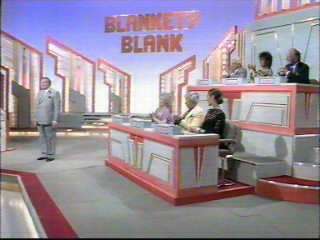 The celebrity panel
The celebrity panelThe host introduced us to the celebrities and then we met the players (to the theme tune). The player who won the toss got to pick from one of two questions. The host read the statement out and then the six celebrities wrote down the answer that they think would fit the blanks. There was usually a tenuous clue within the statement for the celebs and players to pick up on - the phrase, 'The clue is in the question' became one of Dawson's catchphrases. (Incidentally, there were occasionally seven celebrities, in the event of a double act, such as the Krankies or the Chuckle Brothers, filling one celebrity slot - more so in later editions).
Once all the celebs had written something, the player gave their answer. The host then went into the celebs and read out what they put. If the answers matched, the player scored a point (and the celeb got a little mark, normally a circle for the male contestant and a triangle for the female contestant, indicating that they'd matched with that player) and if they didn't match they didn't. The other player then got a go. (Incidentally, it was not uncommon for the celebs to write more than one answer down, and if one of them matched, it was still accepted).
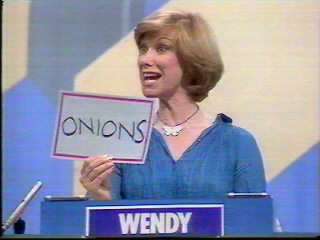 The question was: "The answer to eternal life is ______"
The question was: "The answer to eternal life is ______"Whoever trailed after this opening salvo went first in the second round, where they'd only play with the celebs with whom they didn't match in the first round. The game ended as soon as a clear winner had emerged.
If there wasn't a winner after Round 2 they did sudden death. The players wrote down an answer to the statement and then the celebs each gave answers in turn. The first one to match won.
The loser didn't go away empty handed because they won... a Blankety Blank Chequebook and Pen! It took us ages to realise this was a pun ("blank cheque", y'see) but then we were very young at the time.
The winner went through to the Supermatch Game (with the appropriate "Supermatch Game" theme tune, which was nearly as inane as the "Blankety Blank" one). The legend was revealed revealing a two-word phrase with one word blanked out - examples included: 'Traffic ____', 'Punch ____' and '____ Chop' - make of those what you will. Wogan used to ask some unseen bloke (originally Eugene, later Eamonn - they just had to be Irish names, didn't they?) to reveal the legend, while Dawson would usually say, "Please reveal the leg-end, Alf."
Before the show, the whole audience was polled as to what word(s) should fill in the blank of the Supermatch phrase, and the three most popular answers were hidden away on the board. The winning player was allowed to ask three of the celebs as to what they thought the most popular filler was and afterwards the player was allowed to take one of their words or come up with one of their own. (There could quite often be fillers with more than one word, such as the top answer in one of the examples above, namely 'Punch And Judy'). The words on the board were worth 50, 100 and 150 Blanks depending on popularity, and more blanks meant better prizes (although I've already told you that didn't mean much...).
The game was then played again with two new contestants, and whoever had the most Blanks in the Supermatch Game went forward to the head to head (and if the two winners got the same it would go to sudden death). Here, they could win a better prize (doubling their blanks or a holiday). The player chose one of the celebrities who would write down their answer to a "word BLANK" phrase, normally (but not necessarily) with fewer possibilities than those in the Supermatch game. The player would then give their answer; if they matched, they won, and if not they didn't. (Unlike in the main game, the celebs were seemingly only allowed to write one answer down at this stage, as there clearly had to be more of a 'maybe, maybe not' factor for the endgame).
And that's it really, apart from the hosts. First, there was Terry Wogan where part of the fun was him trying (and failing) to keep the celebrities in check. Then there was Les Dawson who had no respect for the format - and that's what made it funny.
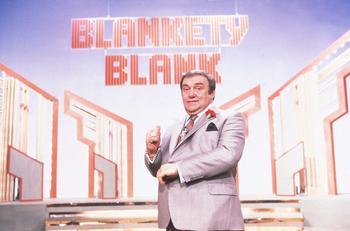 Les Dawson, host of the second incarnation.
Les Dawson, host of the second incarnation.Blankety Blank left the screens in 1990, three years before Dawson's death, during which time he hosted an even more cheap and tacky show, Fast Friends. This was almost certainly an attempt at a new version of Blankety Blank, even giving away address books instead of cheque books and pens as consolation prizes, but Fast Friends flopped after only one series, since it had none of Blankety Blank's entertainment value. Say what you like about Blankety Blank, and many have, it was a very entertaining show, in spite, or maybe because, of its unashamed tackiness. However, Blankety Blank was revived in 1998 with Lily Savage as the host. Acerbic Lily had little respect for the format and had no trouble at all with keeping people in check. That was the funny thing. Everyone thought she would be really bad at it but in fact, she managed to pull quite an audience, and in fact, the show was later renamed "Lily Savage's Blankety Blank" as a result, which was actually a rather dubious honour, but then she was a rather dubious character.
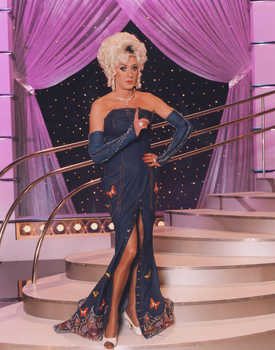 Lily Savage (a.k.a. Paul O'Grady), host of the revival.
Lily Savage (a.k.a. Paul O'Grady), host of the revival.The problem with Lily Savage's humour is that a lot is fairly adult and as a result, about half the show (the funny half) had to be edited from recording to suit the audience. The program defected from the BBC to ITV in 2001, when it lasted a year. Judging by the first episode we wondered whether this was a wise thing to do...
David Walliams gave it a go at Christmas 2016. To be fair, he didn't do a bad job, but was hampered by having to fill an ITV hour (45 minutes of content). Sensibly, when the BBC gave brought it back in 2021 with Bradley Walsh in charge, their episodes lasted for a nice and tight 35 minutes. That's about all it got right though. Third and second place Supermatch Game answers winning £500 and £750? Really?
Key moments
Two 1987 specials featuring the cast of 'Allo 'Allo! and Hi-De-Hi making up the entire celebrity panel. Another one in the same year featured 3 weathermen (Michael Fish, John Kettley, and Ian McCaskill) and the Beverley Sisters.
In a particularly memorable 1987 edition, the BBC had booked 2 sets of identical twins as contestants. Apparently, Les Dawson had not been told about this, so, after he had finished with 2 of the contestants, he had to do a double-take, because there they were again and of course both sets of twins were identically dressed. It was very rare for Dawson to be caught on the hop like that. (The two male twins ended up playing each other in a head-to-head.) In the same year, Mastermind did something similar with the 'Hancock's Half-Hour' edition, in which the married couple Paul and Christine Hancock played against each other, right up to a sudden-death play-off - and they also appeared together on Masterteam.
In a 1990 edition, there was a wheelchair-bound contestant, who won her first game, and Dawson took charge of wheeling her on and off set.
The early opening titles were the best, as they showed each celebrity in turn, either giving a cheesy wave and/or grin to the camera or (especially with the likes of Kenny Everett, Roy Hudd and Barry Cryer) performing a brief visual gag (or quite often both). This was initially by means of a revolving image (during the Wogan-era), then later by visuals that parted in the style of curtains to show each celeb's face (during the early Dawson-era). Cheesy it may have been, it was still fun, and far better than the later titles (from around 1987), which did little more than play the "classic" tune and show the name of the programme - definitely a disappointing replacement. Pleasingly, though, the current Bradley Walsh version has revived the original format for the titles.
It's currently part of the National Curriculum for media students to study the classic microphone-bending antics of Kenny Everett during the Wogan years. Not really. But it should be. Incidentally, his microphone was nothing more than a prop with which to gesticulate - if you look carefully, he was working off a standard mic in his lapel. Everett's other antics on the show included dancing around with one of the prizes - a mug tree - and breaking most of the mugs, surprise, surprise! He also once produced a Spanish packet of peanuts called 'Bum' and, when Wogan would ask the celebrities to hold up 'Ready' cards when they had written their answers, Everett would hold up a massive, placard-sized one. Everett was a regular during the Wogan era, but not during the Dawson-era - it's probably fair to say that the show wouldn't have been big enough for both Dawson and Everett, given that Dawson was a rather more dominant personality than Wogan.
One rather bizarre moment occurred during a Wogan-episode, probably around 1983. One panellist, Bernie Winters, had been dishing out bouquets and pot-plants to his fellow-celebrities throughout the show, and he eventually presented Wogan with a massive bouquet. The next thing we knew, a rather harassed Wogan was hammering on the side (possibly with a door there, we never knew) of the revolving panel and shouting, "Eamonn, Eamonn!" so that he could be relieved of said bouquet and thus have his hands free to continue with the show. It was probably an off-camera studio runner who took it off him in the end.
An outtake that was shown on the BBC's 'Auntie's Bloomers' showed a technician trying to deal with some rapidly-disappearing décor from the revolving set, including the contestants' name-panels, and host Dawson saying to him, with perhaps a little too much relish, "It's not just me that makes the cock-ups, is it?" At that point, the set started to revolve and knocked into Dawson, who uttered a swear-word that had been bleeped out.
Catchphrases
(Wogan and Dawson):
"Lights on when you're ready, please..."
"This is Supermatch. We held a poll with the studio audience to ascertain what they thought was a correct phrase or saying. Rising in popularity, we have 50 blanks, 100 blanks, and 150 blanks - and these are the prizes you could be winning on Blankety Blank". (Dawson usually added in some little jibe about the quality (or lack of it!) of the prizes).
"For 50 blanks, we have...!" and ditto for 100 and 150 blanks.
"Will you please join me for the Supermatch?"
(Wogan, if the contestant chose Card B instead of A at the beginning): "B it shall be..."
(Les Dawson era):
"Reveal the legend!" or, "Please reveal the leg-end, Alf!"
"Remember - the clue is in the question!"
(To panellists) "What have you got for meeeee?"
(To the contestants, in the event of a tiebreaker): "...And the first one to hold the card aloft will be deemed the winner."
"But you're not going away empty-handed - no, by Jiminy, you're not! You're taking away with you" (pause for dramatic effect) - "a Blankety Blank cheque book and pen!" (followed by a stamp of his foot). (He sometimes changed it to, "A Blankety Blank cheque pen and book.")
"...And for the benefit of our viewer, Arthur, in Cheltenham - good night, God bless."
Inventor
Based on the US Goodson-Todman show The Match Game (latterly known as simply Match Game).
Theme music
Original music was by Ronnie Hazlehurst and performed by Jason McDermid, Alison Jiear and David Bryant. So now you know.
Trivia
Before Lily Savage's version, the BBC aired a selection of Wogan episodes from November 1997 to February 1998 in a daytime slot before Children's BBC programming with newly recorded introductions and sign offs from the man himself.
All good things come to those who wait. So do long-lost episodes of Blankety Blank. Eight episodes of Lily Savage's 2002 series of the show were never shown on ITV. They emerged on the Challenge channel in 2005, then again in February 2011 and again in September 2016. One episode included a posthumous appearance of A Song for Europe host Christopher Price.
The late Captain Sir Tom Moore, the retired soldier and future NHS fundraiser, was a contestant on Terry Wogan's last episode, the 1983 Christmas special.
Les Dawson's second series took an unexpected mid-series break due to Dawson almost dying of prostate failure, which he might have got away with the press not knowing about had he not missed a recording session. For at least the last two episodes he'd recorded beforehand he was noticeably ill; you'd think the BBC would have had a stand-by presenter but apparently not. Or did Dawson himself insist on carrying on regardless in spite of everything - 'the show must go on' and all that? Possibly, but we'll never know for sure.
The first episode of Bradley Walsh's second series was pulled twice by the deaths of queens; its premiere by the death of Queen Elizabeth II, which caused the entire series to be knocked back by a week, while a 1 April 2023 repeat was replaced by a repeat of a 1998 episode from Lily Savage's Blankety Blank, in tribute to the late Paul O'Grady.
Just to really ram home how inappropriate the £500 and £750 third and second place Supermatch prizes they had during the Bradley Walsh era were, an example star prize from his second series was a £500 Christmas voucher. It's not a good look when your star prize is worth less than your third place Supermatch prize.
Half an episode was played for Children in Need 2022, with Maisie Smith outblanking John Whaite and winning £20,000 for charity. The celebrities were six recipients of Children in Need assistance, which begs the question; why do the celebrities have to be celebrities? Why not mount a daytime series with ten civilians each week, with four playing each day, not unlike Moneybags?
Merchandise
A board game was available.
Web links
BBC programme pages: Blankety Blank, Lily Savage's Blankety Blank, 2020s revival
Andy Walmsley's set design (BBC)
Andy Walmsley's set design (ITV)
Opening titles from 1979, 1980, 1986, 1988 and 1997 in the BBC Motion Graphics Archive
Pictures
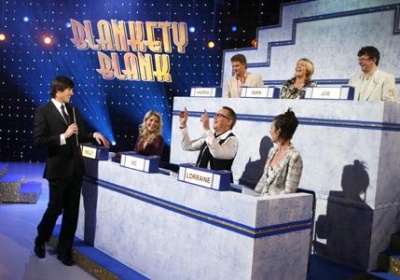 Vernon Kay hosting the Gameshow Marathon version of the show.
Vernon Kay hosting the Gameshow Marathon version of the show.See also
Weaver's Week reviews of the 2016 and 2020 revivals.

